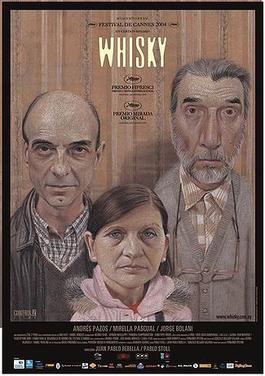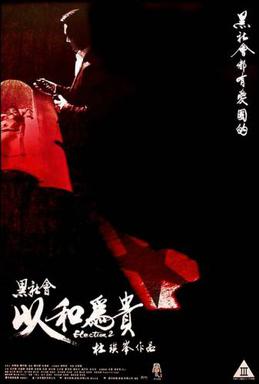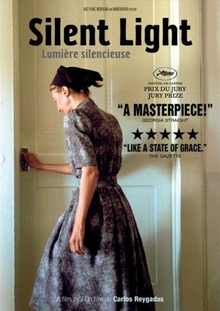
L'Enfant is a 2005 Belgian film directed by Jean-Pierre and Luc Dardenne, starring Jérémie Renier and Déborah François. The film was released under its French title in the US, and as The Child in the UK.

Whisky is a Uruguayan tragicomedy film directed by Juan Pablo Rebella and Pablo Stoll and released in 2004. The film stars Andrés Pazos, Mirella Pascual, Jorge Bolani, Ana Katz, and Daniel Hendler. It has sparse dialogue and the three principal actors play very rigid roles depicting little emotion. It was premiered at the 2004 Cannes Film Festival where it won the Un Certain Regard and FIPRESCI Awards. It was Juan Pablo Rebella's last film as he died in 2006, two years after the release of the film.

Election 2, also known as Triad Election in the United States, is a 2006 Category III Hong Kong crime film directed by Johnnie To with a large ensemble cast including Louis Koo, Simon Yam and Nick Cheung. A sequel to the 2005 film Election, the film concludes the events of the first film centring on triad boss Lok, who struggles to get re-elected as his two-year term approaches its end. He faces competition from Jimmy, who wants to retire from the triad to be a legitimate businessman, but gets drawn into the conflict surrounding the election.

Woman Is the Future of Man is a 2004 South Korean film directed by Hong Sang-soo. The film was not a box-office hit, but was entered in the competition category of the 2004 Cannes Film Festival and received screenings at several other festivals. The title of the film is a translation of a line from a poem by Louis Aragon that the director saw printed on a French postcard.

Carlos Reygadas Castillo is a Mexican filmmaker. Influenced by existentialist art and philosophy, Reygadas' movies feature spiritual journeys into the inner worlds of his main characters, through which themes of love, suffering, death, and life's meaning are explored.

Silent Light is a 2007 film written and directed by Carlos Reygadas. Filmed in a Mennonite colony close to Cuauhtémoc, Chihuahua State, Northern Mexico, Silent Light tells the story of a Mennonite married man who falls in love with another woman, threatening his place in the conservative community. The dialogue is in Plautdietsch, the Low German dialect of the Mennonites. The film was selected as the Mexican entry for the Best Foreign Language Oscar at the 80th Academy Awards, but it did not make the shortlist. The film was nominated for Best Foreign Film at the 24th Independent Spirit Awards. It gained nine nominations, including all major categories, in the Ariel Awards, the Mexican national awards.

24 City is a 2008 film directed and co-written by Chinese film-maker Jia Zhangke. The film follows three generations of characters in Chengdu as a state-owned factory gives way to a modern apartment complex. The film was also known as The Story of 24 City during production.

Japón is a 2002 film by the Mexican director Carlos Reygadas. It was Reygadas' debut feature, which was shot on anamorphic 16-millimeter film in a 2.88:1 screen aspect ratio.

Amat Escalante is a Mexican film director, producer and screenwriter. He is most well known for directing the controversial Mexican crime thriller Heli for which he was awarded the best director prize award at the 2013 Cannes Film Festival, and for directing the 2016 Mexican drama The Untamed for which he received the Silver Lion for best director at the 2016 Venice Film Festival.

Holy Motors is a 2012 fantasy drama film written and directed by Leos Carax and starring Denis Lavant and Édith Scob. Lavant plays Mr. Oscar, a man who appears to have a job as an actor, as he is seen dressing up in different costumes and performing various roles in several locations around Paris over the course of a day, though no cameras or audiences are ever seen around him. The film competed for the Palme d'Or at the 2012 Cannes Film Festival.

The 65th Cannes Film Festival was held from 16 to 27 May 2012. Italian film director Nanni Moretti was the President of the Jury for the main competition and British actor Tim Roth was the President of the Jury for the Un Certain Regard section. French actress Bérénice Bejo hosted the opening and closing ceremonies.
Mantarraya Productions, is an independent cinema production company funded in 1998. On their web page they define Mantarraya as; "... works as a platform for a new generation of filmmakers and has earned a reputation for promoting new talent".

A Perfect Day is a 2015 Spanish comedy-drama film written and directed by Fernando León de Aranoa. It is based on the novel Dejarse Llover by Paula Farias. It was screened in the Directors' Fortnight section at the 2015 Cannes Film Festival and is the director’s English-language debut.
Nathalia Acevedo is a Mexican actress best known for her acting debut in Carlos Reygadas' Post Tenebras Lux which premiered in competition at the 2012 Cannes Film Festival and won for Reygadas the Best Director Award. Her most notable roles since include starring alongside Tadanobu Asano, in Filipino cult director Khavn De La Cruz’s, Ruined Heart, in 2014 and starring in Illum Jacobi's The Trouble with Nature.

Coproduction Office, founded in 1987, is composed of four production divisions in Berlin, Paris, Copenhagen and London, and an international sales company, all specialised in Auteur Cinema. Coproduction Office’s founder Philippe Bober has produced forty films to date with twelve of these having been selected to screen in Competition in Cannes, winning two Golden Palms: Triangle of Sadness and The Square both by Ruben Östlund.

Our Time is a 2018 Mexican drama film directed by Carlos Reygadas. It was selected to be screened in the main competition section of the 75th Venice International Film Festival.

Bacurau is a 2019 Weird Western film written and directed by Kleber Mendonça Filho and Juliano Dornelles. It stars Sônia Braga, Udo Kier, Bárbara Colen, Thomas Aquino, Silvero Pereira, and Karine Teles. The film, a co-production between Brazil and France, revolves around Bacurau, a fictional small town in the Brazilian sertão that is beset by strange happenings following the death of its matriarch, Carmelita, at the age of 94. The film was selected to compete for the Palme d'Or at the 2019 Cannes Film Festival, and won the Jury Prize.

Give Me Liberty is a 2019 American comedy drama directed by Kirill Mikhanovsky. The film had its world premiere on the opening night of the Sundance Film Festival on January 24, 2019. The film had its world premiere in the Directors' Fortnight section at the 2019 Cannes Film Festival.

Great Freedom is a 2021 drama film directed by Sebastian Meise. In June 2021, the film was selected to compete in the Un Certain Regard section at the 2021 Cannes Film Festival. At Cannes, the film won the Jury Prize in the Un Certain Regard section. It won the Golden Giraldillo at the Seville European Film Festival. It was selected as the Austrian entry for the Best International Feature Film at the 94th Academy Awards, and on 22 December 2021, it was shortlisted for the award ceremony.
Murina is a 2021 internationally co-produced drama film, directed by Antoneta Alamat Kusijanović, in her directorial debut, from a screenplay by Alamat Kusijanović and Frank Graziano. It stars Gracija Filipović, Leon Lučev, Danica Curcic, and Cliff Curtis. Martin Scorsese served as an executive producer under his Sikelia Productions banner.

















